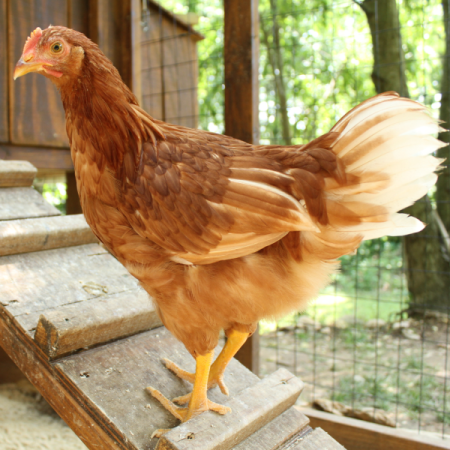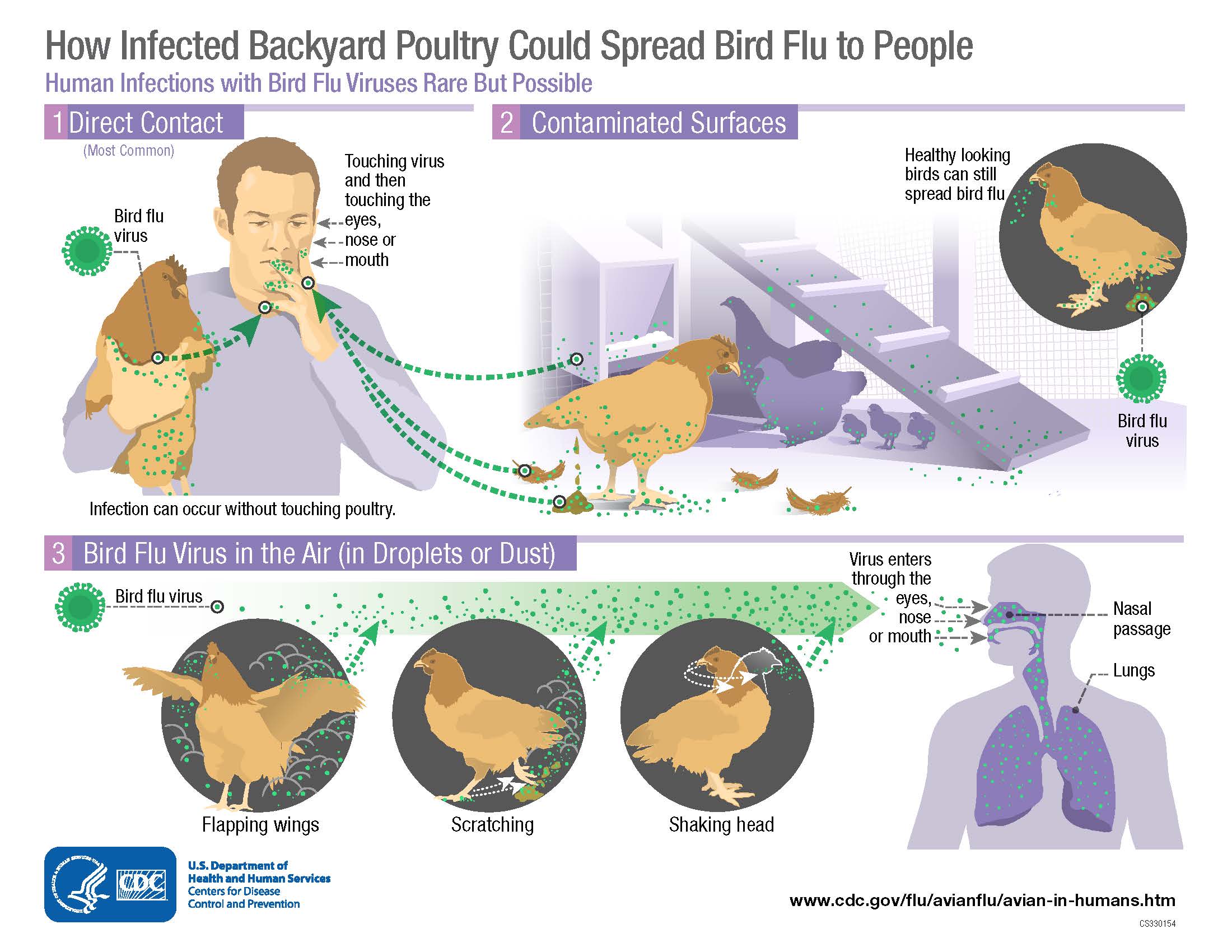 Avian influenza, or bird flu, is a disease caused by an influenza (flu) A virus, such as H5N1. Bird flu is contagious and infects poultry (e.g., chickens, turkey, ducks) and other wild birds. H5N1 bird flu is widespread in bird populations and has caused the deaths of millions of birds in the United States. This same H5N1 virus also been identified as recently infecting dairy cattle herds in 9 states.
Avian influenza, or bird flu, is a disease caused by an influenza (flu) A virus, such as H5N1. Bird flu is contagious and infects poultry (e.g., chickens, turkey, ducks) and other wild birds. H5N1 bird flu is widespread in bird populations and has caused the deaths of millions of birds in the United States. This same H5N1 virus also been identified as recently infecting dairy cattle herds in 9 states.
At this time, the Centers for Disease Control and Prevention (CDC) says the risk of H5N1 bird flu infection for the general public who do not have exposure to infected animals remains low. There have been no reported H5N1 bird flu infections in dairy cows or people in Virginia.
Human bird flu infections are rare, but possible. Bird flu can spread to humans from infected animals when enough virus gets into a person’s eyes, nose, or mouth or is inhaled. Recently there have been three human cases associated with an ongoing multistate outbreak in U.S. dairy cows (one additional case was identified in 2022 with no links to cows). To date, there has been no evidence of person-to-person spread of H5N1. However, people with close, long, unprotected contact with infected animals, or environments contaminated by infected animals are at higher risk of getting infected. So far, such infections have been rare.
Information for Backyard Flock Owners
Backyard poultry can carry germs that can make you sick. Follow general guidance keep you and your backyard flock healthy. Watch this video about keeping your flock healthy.
Bird flu can spread quickly in your flock. Prevent contact with wild birds. Know the signs of bird flu and have a plan for what to do if your birds get sick.
And always wash your hands with soap and water before and right after handling eggs, chickens, or anything in their environment.
 Domesticated poultry can get infected with bird flu viruses through direct contact with infected waterfowl or other infected poultry, or through contact with contaminated surfaces. See this infographic about how backyard poultry can spread bird flu to people (Spanish version).
Domesticated poultry can get infected with bird flu viruses through direct contact with infected waterfowl or other infected poultry, or through contact with contaminated surfaces. See this infographic about how backyard poultry can spread bird flu to people (Spanish version).
According to the CDC, infected birds may show one or more of the following signs:
- Sudden death without prior illness
- Lack of energy and appetite
- Decreased egg production or soft-shelled or misshapen eggs
- Swelling of head, comb, eyelid, wattles, and hocks
- Purple discoloration of wattles, comb, and legs
- Nasal discharge, coughing, and sneezing
- Incoordination
- Diarrhea.
An occasional unexplained bird death is normal. Several dead or ill birds in your flock is not normal. If there is no obvious cause of death and you see any sign of illness in your birds, take steps to protect yourself:
- Use personal protective equipment (PPE) when around sick or dead birds. Don’t touch sick or dead birds, their feces, litter, or any surface or water source that might be contaminated with their saliva, feces, or any other bodily fluids without wearing PPE. Learn more about recommended PPE and safe PPE removal.
- Wash your hands with soap and water after touching birds.
- Avoid touching your mouth, nose, or eyes after contact with birds or potentially contaminated surfaces and materials until you have washed your hands well.
- As best as possible avoid stirring up dust, bird waste, and feathers when cleaning to prevent virus from spreading into the air. See this checklist for cleaning.
- Immediately report unusual deaths or multiple sick birds to State Veterinarian’s Office at 804-692-0601 or at vastatevet@vdacs.virginia.gov or the U.S. Department of Agriculture by calling 1-866-536-7593.
Additionally, you should check yourself for symptoms for 10 days after the last day of exposure to potentially infected birds or contaminated materials. See a healthcare provider if you become ill (even if symptoms are mild) after contact with sick birds and let them know before your visit of your recent exposure and symptoms. Stay away from other people and do not go to work or school until you have been evaluated.
See more detailed information from the CDC about protecting yourself from Bird Flu.
See more information and resources from the U.S. Department of Agriculture about protecting your flock.
Additional Information
Everyone can take steps to protect themselves from bird flu.
- Avoid direct contact with wild birds. Observe them only from a distance, if possible.
- Avoid touching sick or dead animals and surfaces that may have been contaminated with their feces. Learn what to do if you find dead birds.
- Wash your hands and surfaces thoroughly before and after handling poultry, meat, and eggs.
- Drink pasteurized milk, not raw milk/milk products.
- Cook poultry, meat, and eggs to the right internal temperature to kill bacteria and viruses, including H5N1 viruses.
- Get your yearly flu vaccine to reduce the risk of human influenza infection and of human and bird flu infections occurring together.
For the information on the most recent bird flu developments in the U.S., please visit the CDC Current Situation Summary page or the VDH Novel and Variant Influenza (Flu) A Viruses page.
Visit our web page and follow us on social media for updates on bird flu as they are available and other health topics.

